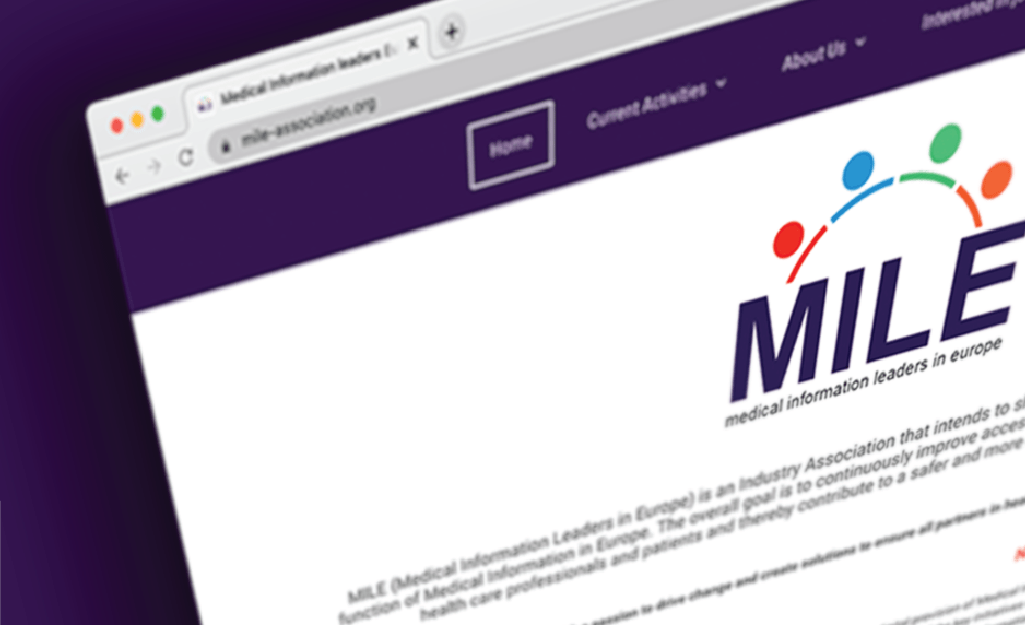Poor quality and quantity of pharmaceutical online medical information services in Europe may be creating barriers and delays for healthcare professionals (HCPs) attempting to access reliable sources of information, say industry experts.
MILE, the association of Medical Information Leaders in Europe, has issued an urgent call-to-action for a review of pharmaceutical industry regulation in Europe.
“Collectively, the pharmaceutical industry, regulators and industry associations have a social and professional responsibility to urgently develop and implement a specific governance model and quality framework for online MI resources“, states the paper, which cites research by CREATION.co among its sources and is published in the Pharmaceutical Medicines journal.
Here’s our summary of twelve essential points in the MILE position paper:
HCPs are already accessing clinical information online, but not from pharmaceutical companies:
- HCPs find it helpful to discuss clinical topics on social media.
- Physicians value internet resources as much as journal articles for accessing clinical information. For non-physician HCPs including nurses and pharmacists, 49% primarily choose internet resources for clinical information.
- When making clinical decisions, the majority of HCPs are currently more likely to use non-pharma internet resources than pharma websites.
- In the battle against the “infodemic” of misinformation, pharmaceutical companies could become reliable sources if they were to openly post online medicine information on products.
Despite being a highly-regulated industry, there is little clarity about what is allowed when it comes to pharmaceutical companies publishing medical information online:
- The advertising of prescription-only medicines to the general public is prohibited by regulators in Europe, but there is no clarity from regulators regarding the provision of medical information to the public.
- Fear of information being perceived as promotional limits the industry from providing constructive non-promotional services for HCPs online.
- The European Medicines Agency has called for greater innovation and collaboration to improve clinical decision-making and enhance patient care.
- Given the prevalence of internet use by HCPs accessing clinical information, Medical Information functions should become a trusted, accessible online channel for pharmaceutical industry medicine knowledge.
Pharmaceutical companies are not meeting HCPs’ online information needs:
- It appears that among countries in Europe, most pharmaceutical companies have no plans to launch a dedicated Medical Information website. This contrasts significantly with the United States, where the majority of pharmaceutical companies offer online Medical Information Services.
- Among the few cases where a dedicated Medical Information website has been launched in Europe, Germany has seen the greatest number of pharmaceutical companies do so.
- Most websites offer HCP enquiry submission, contact details and links to SmPCs. However, additional content and services were less frequently offered, e.g. chat live functionalities, searchable scientific responses including information outside of the label or a list of FAQs.
- The range of methods for verifying HCP access to pharma Medical Information sites in Europe complicate the HCP experience, creating barriers and delays in accessing information.
MILE concludes that the application of regulatory compliance rules that were designed to control promotional activities is constraining pharmaceutical companies from providing essential, non-commercial, online resources for HCPs.
Comment:
This important paper highlights the tension between two obligations faced by pharmaceutical companies in Europe: they must provide an effective medical information service; and they must not promote medicines.
In my experience working with medical information professionals, there is in fact no conflict here, since their work providing information to HCPs is indeed non-promotional. Yet as HCPs have rushed online, and even more so throughout the COVID-19 pandemic, traditional, non-digital channels of medical information are increasingly antiquated and misaligned with HCP needs.
With limited examples of online medical information resources for HCPs in Europe, it is time for medical information leaders in Europe’s pharmaceutical companies to take action. Here are three steps that could help you get started:
- Discover where your own company has initiated online medical information initiatives in Europe, and what lessons have been learned so far.
- Use the MILE paper to initiate a new conversation with cross-functional colleagues inside your company to develop a clear position on what could be possible for your own company’s digital medical information services.
- Get outside and talk with peers in other pharmaceutical companies (you could start with the paper’s authors), share experiences and consider how you could collaborate to support this call for a governance model.
If you’d like some support as you get started, we’d love to help. CREATION.co has been studying and enabling the online engagement of HCPs and pharmaceutical companies for more than twenty years, and sharing our learnings with medical information teams throughout that journey.
You can read the full MILE paper here. Or, if you’d like to see the copy that I highlighted and annotated while writing this response, I’d be happy to share it with you so please ask me at @creationdaniel.
 By Daniel Ghinn
By Daniel Ghinn 

